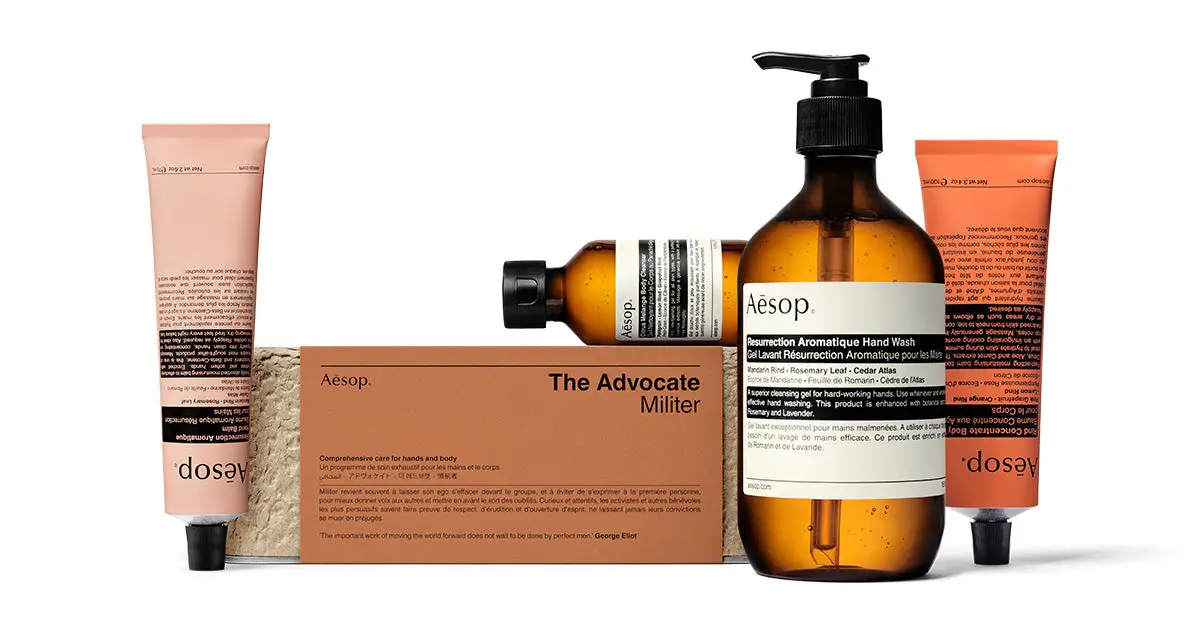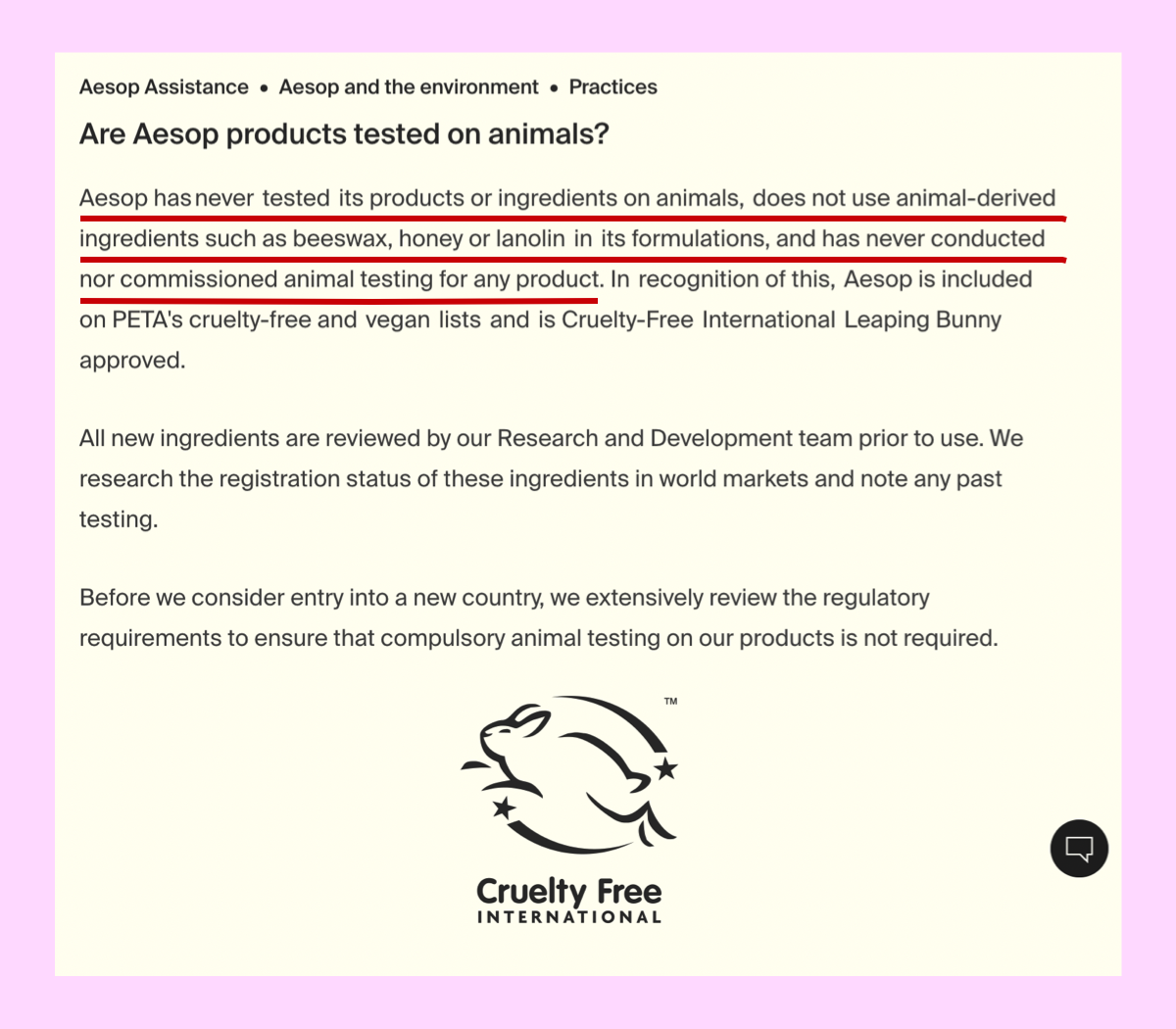Aesop embodies minimalism, indulgence, and luxury. They’re an industry leader with a solid cruelty-free and vegan ethos. But is it worth the price?
Aesop is cruelty-free. It doesn't conduct animal testing on its products, nor does it distribute its cosmetics where animal testing is required by law. Aesop is also 100% vegan and doesn't use animal-derived ingredients.
Australian hairdresser, Dennis Paphitis, developed Aesop in 1987 after he famously began mixing essential oils into his hair dyes to combat the strong smell of ammonia.
Aesop’s ethos was to go above and beyond to spoil the customer – nothing has changed!
They’ve strived to make everything an unrivaled luxurious experience – from the product to the unique stores they sell them in.
BUT...
We also feel that Aesop can come off as a bit ostentatious. They have plenty of eye-roll-worthy statements about their policies and beliefs.
For example, their employees are forbidden from talking about the weather and how they are not a cult?
Because nothing screams “we’re not a cult,” like employees stating that they need to “share a life together.”
So we have to ask…
All things considered, is their cruelty-free and vegan handwash really worth $31?
And do we really need to chain their products to the sinks in hotels and restaurants?
Is Aesop Cruelty-Free and Vegan?
Aesop is 100% Cruelty-Free
It does not:
Aesop is a proudly cruelty-free brand. The brand has never tested on animals, from raw ingredients to the final product. Nor have they asked anyone to do it on their behalf through third-party testing.
Aesop is owned by Natura & Co, a Brazilian personal care and cosmetics group against animal testing. (Yay!)
This brings us to our next point:
Aesop is Vegan
We can sigh in relief because this botanical-inspired skincare brand is entirely vegan. It does not use any animal-derived ingredients in any of its products.
However, it's worth knowing that Aesop is the exception and not the rule.
Most mainstream skincare brands are not 100% vegan. These are certain animal-derived ingredients to look out for in general:
If you're interested in the best Aesop vegan products or finding brand alternatives – keep reading or click on this link: Aesop vegan products.
Animal Testing Policy and History
Aesop is cruelty-free and committed to the cause. They claim to have never tested their products on animals since launching in 1987.
Aesop also claims that its ingredient suppliers stopped testing on animals back in March 2009. We must say this brand’s transparency is refreshing!
Cruelty-Free Status in 2022
Here is a screenshot of Aesop's official statement regarding its cruelty-free policies and vegan products, taken from its website:
Certification
Aesop is Leaping Bunny and PETA certified!
YES! This is about as good as it gets.
While you might know PETA very well – it surprisingly doesn’t hold the strictest cruelty-free regulations. It only requires a brand’s written consent that abides by the PETA code of conduct.
Certification from Leaping Bunny is ideal because it holds rigorous standards and does regular audits to ensure they are upheld.
Leaping Bunny certification proves that:
If you see a bunny stamp on the back of your product bottle – that's an excellent sign. But don't let the image itself fool you. A lot of brands are using fake logos to deceive consumers.
Do your homework and see which products are genuinely cruelty-free first. This article will help you: Which Cruelty-Free Logos Can You Trust?
Is Aesop Sold Where Animal Testing is Required By Law?
Aesop does not distribute any of its products to China or any country that requires animal testing on cosmetics by law.
China has a shocking track record. It is the country with the most animal testing globally, with over 20 million animals used per year.
However, if you live in China or are concerned about its cruel beauty policies, there are a couple of loopholes.
Here's how to find cruelty-free cosmetics in China: Are Cosmetics Made in China Cruelty-Free?
The Best Vegan Aesop Products
When it comes to luxurious vegan personal care – Aesop is definitely an industry leader. It has a great range of products that continues to expand.
To save you some time, here are some of its most popular items to choose from:
You can find a complete list of Aesop vegan products on their website.
Vegan Alternatives to Aesop
We love that Aesop is 100% cruelty-free and vegan! Plus, users claim it to be effective too.
But at that price, they aren’t exactly affordable. If the brand is not easily accessible to you, here are some other options to choose from:
Is Aesop Natural and Organic?
Aesop clearly states that they will not use the terms “organic” or “natural” to describe their products.
Although they use many natural ingredients, their formulas are still scientifically formulated to perform specific functions. Aesop aims to make clean, high-quality, and skin-friendly products.
Clean vs. Natural Ingredients
The term "natural" is not regulated for cosmetics and skincare. In other words, it doesn't hold one specific meaning.
Usually, it means a product is free of more toxic synthetic ingredients, including parabens, phthalates, sulfates, and more. But people also interpret "natural" to mean ingredients of immediate plant origin.
Here's the thing: "natural" is not necessarily good. Just because an ingredient is natural (take egg whites, for example) doesn't mean you should rub it on your skin and risk a salmonella infection!
All products use a certain amount of synthetic ingredients in their formulas. Aesop is no exception – but it does choose to use better or clean synthetics.
If a synthetic ingredient is "clean," it means it is safe and non-toxic for us. Its purpose is to preserve the stability of a beauty formulation.
A few naturally-derived ingredients Aesop uses to enhance its cosmetics include:
Does Aesop Use Safe Ingredients?
According to Skin Safe, Aesop has an 82 – 91% allergen-free ranking for each product.
Aesop’s products are free of allergens like mineral oil, petrolatum, and parabens. The brand also avoids nickel, gluten, soy, dyes, propylene glycol, MCI/MI, and irritants.
Reading the ingredient list is crucial because Aesop is not 100% hypoallergenic or non-comedogenic, and they do not claim to be.
However, certain products are specifically for these concerns, so make sure you buy what your skin needs.
The EU/UK Have Stricter Ingredient Regulations
We don’t want to scare you, but you HAVE to read up on any product’s ingredient list before you make a purchase – especially if you live within the United States. The reason why will shock you.
The FDA has only banned or restricted 11 harmful chemicals from cosmetics within the country. Europe and the UK, on the other hand, have banned 1,328!
Luckily, Aesop sets a great example of what true clean beauty is meant to be. So you shouldn’t have to worry about any serious hidden nasties in its products.
With personal care products, you want to avoid these ingredients:
Are Cruelty-Free Ingredients Safe?
If you’re worried about how safe it is to use cosmetics not tested on animals – please relax and take a sigh of relief.
There is no reason why cruelty-free products shouldn’t be as safe as anything tested on animals.
Not only is it easy to test ingredients without using animals altogether, but there are so many pre-approved ingredients you can use to make cosmetics that there is no need.
If you’re interested, here’s more on the subject: Are Cruelty-Free Cosmetics Safe?
Is Aesop Sustainable and Ethical?
Aesop has clear, sustainable, ethical initiatives that align with the company’s values.
Once again, they win our hearts with how transparent they are about everything they do – from climate action initiatives, manufacturing, and packaging, to their social impact initiatives.
But wait – there’s more!
Aesop is also one of the few brands that release sustainability reports. These are a great way to help you keep track of precisely what they have achieved, failed at, and what they aim to achieve in the future.
Some of the ethical initiatives Aesop undertakes include:
Aesop also established the Aesop Foundation in 2017 to partner with not-for-profit organizations. It focuses on helping build literacy and storytelling skills.
It's no secret that the world has a huge waste problem, and cosmetic brands only make it worse by using unsustainable packaging and harmful ingredients.
Some of the ways Aesop is taking strong environmental accountability is by:
Final Thoughts
If you’ve got a hole burning in your pocket for fancy suds and serums, then Aesop could be just what you’re looking for.
There’s a lot to love about Aesop. They’ve been going strong for over 30 years and have always been proudly cruelty-free, vegan, and very involved in sustainability initiatives.
You can’t deny that they go over and above to ensure everything is done correctly, and they’re transparent enough to prove it. And thankfully, that has also gone into actively being kinder to the planet and everything living on it.
The brand is more than the products they sell, so it’s not difficult to see how they’ve gotten such a devoted cult following throughout the years.
Aesop seems to be very interested in what its customers want. So if you have any feedback – chances are that they’ll listen to you too!


